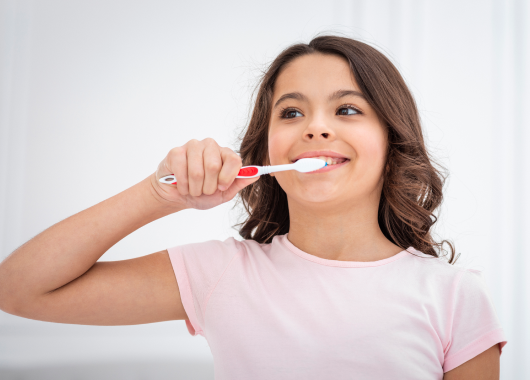Oral Health for Kids: Establishing Good Habits Early On

Teaching kids the importance of oral health from an early age is one of the best gifts you
can give them. Not only does it lay the foundation for a lifetime of healthy smiles, but it
also helps prevent painful dental problems and costly treatments down the road.
Establishing good oral hygiene habits might seem challenging at first, but with the right
approach, you can turn it into a fun and rewarding experience for your child. Here's how
you can help your kids build a solid foundation for oral health from an early age.
Start Early: The Earlier, the Better
Good oral health begins even before your child's first tooth emerges. It might surprise
you, but cleaning your baby's gums with a soft, damp cloth after feedings is an excellent
way to start. This not only keeps the gums clean but also gets your little one
accustomed to having their mouth cleaned.
When the First Tooth Appears: As soon as the first tooth erupts, usually around six
months, switch to using a soft, baby toothbrush. Use a smear of fluoride toothpaste
about the size of a grain of rice and brush gently. As your child gets older, you can
increase this to a pea-sized amount.
Make Brushing Fun
Brushing doesn't have to be a chore, especially for kids. Making it an enjoyable activity
can encourage them to develop a positive attitude toward oral hygiene. You could try:
- Choosing a Fun Toothbrush: Let your child pick out a toothbrush with their favorite cartoon character or in their favorite color. There are even toothbrushes that light up or play music, making brushing time something to look forward to.
- Sing a Song: Brushing should last for at least two minutes, but for kids, that can feel like forever. Sing a favorite song or play a two-minute brushing video to make the time go by faster.
- Use a Brushing Chart: Create a brushing chart where your child can put a sticker each time they brush. After a week of consistent brushing, reward them with a small treat (preferably not candy!).
Teach Proper Brushing Techniques
 It's not just about brushing—it's about brushing correctly. Show your child how to brush
their teeth in gentle, circular motions, covering all sides of their teeth and gums. Be sure
to explain the importance of brushing the back teeth, where plaque often builds up.
It's not just about brushing—it's about brushing correctly. Show your child how to brush
their teeth in gentle, circular motions, covering all sides of their teeth and gums. Be sure
to explain the importance of brushing the back teeth, where plaque often builds up.Supervise and Assist: Children need supervision until they develop the coordination to brush effectively, usually around the age of 7 or 8. Help them with brushing and flossing, and gradually allow them to take over as they grow more confident.
Introduce Flossing Early
Flossing is just as important as brushing, but many parents overlook it. As soon as your child has two teeth that touch, it's time to start flossing. Flossing removes food particles and plaque that a toothbrush can't reach, preventing cavities between teeth. Use Floss Picks: Floss picks are a kid-friendly way to introduce flossing, as they're easier for little hands to manage. Be patient, and show your child how to use them correctly until they're able to do it on their own.
Limit Sugary Foods and Drinks
Kids love sweets, but sugary foods and drinks are the leading cause of cavities. Limit your child's consumption of sugary snacks, sodas, and juices, and encourage healthier options like fresh fruits, vegetables, and water.
Healthy Snacking: Offer snacks that are good for their teeth, such as cheese, yogurt, and crunchy vegetables. These foods not only promote good oral health but also help keep their teeth clean.
Make Regular Dental Visits a Priority
Taking your child to the dentist regularly is crucial for maintaining good oral health. The American Dental Association recommends that children visit the dentist by their first birthday or within six months of their first tooth erupting.
Create a Positive Experience: Help your child feel comfortable with dental visits by explaining what to expect and emphasizing that the dentist is there to keep their teeth healthy. Regular check-ups also allow the dentist to spot any potential issues early on, preventing more serious problems down the road.
Set a Good Example
Children learn by watching, so be a role model for your child's oral health. Brush and floss your teeth together, showing them that taking care of your teeth is a normal and important part of daily life.
Be Consistent: Make oral hygiene a non-negotiable part of your child's routine, just like bedtime or bath time. The more consistent you are, the more likely they are to adopt these habits for life.
Establishing good oral health habits early on is one of the most valuable things you can do for your child. By teaching them to brush, floss, eat healthily, and visit the dentist regularly, you're setting them up for a lifetime of strong, healthy teeth. Remember, the key is to make it fun, be patient, and lead by example. The effort you put in now will pay off with a lifetime of happy, healthy smiles!
